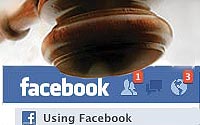Divided Court OK's Facebook's Privacy Foundation
- by Wendy Davis @wendyndavis, September 20, 2012

A divided federal appeals court ruled on Thursday that Facebook can create a new privacy foundation in order to settle a class-action lawsuit stemming from its defunct Beacon ad program.
A panel of the 9th Circuit Court of Appeals voted 2-1 to uphold the settlement, which was approved two years ago by U.S. District Court Judge Richard Seeborg.
"We affirm the district court’s holding that the settlement was fundamentally fair," the majority wrote. The appellate court specifically rejected opponents' arguments that Facebook will exert too much control over the new organization, called the Digital Trust Foundation.
The decision paves the way for Facebook to move forward with the new foundation, which is part of a $9.5 million settlement package. The deal calls for Facebook to pay $6.5 million to fund the Digital Trust Foundation, to be directed by a three-person board that includes Facebook's director of public policy, Tim Sparapani.
The social-networking giant also will pay the 19 consumers who filed suit amounts varying from $1,000 to $15,000, and around $2.5 million to the attorneys who brought the case.
Senior Circuit Judge Andrew Kleinfeld dissented from Thursday's ruling. "This settlement perverts the class action into a device for depriving victims of remedies for wrongs, while enriching both the wrongdoers and the lawyers purporting to represent the class," he wrote. "Facebook deprived its users of their privacy. And now they are deprived of a remedy."
The settlement stems from Facebook's 2007 Beacon initiative -- the company's first major foray into social advertising. The marketing platform informed members about their friends' e-commerce activity on outside sites like Overstock.com and Blockbuster.com.
At launch, the program operated by default, so that people who didn't opt out ended up disclosing their purchases to all of their Facebook friends. The feature caused an immediate backlash and, approximately three weeks after launching Beacon, Facebook said it would stop blasting notifications about users' retail activity without their explicit permission. (Shortly after that, Facebook offered users a way to permanently opt out.)
In 2008, 19 Facebook users filed a class-action lawsuit over the program on behalf of all users affected by Beacon. The best known of the consumers, Sean Lane, said he intended to surprise his wife at Christmas with a diamond ring he bought from Overstock.com. But the Beacon platform blindsided him by broadcasting news of the purchase to his 700 Facebook friends.
Facebook and the consumers who sued agreed to settle the case in 2009, but the deal drew a court challenge from several other users, including privacy activist Ginger McCall -- a Facebook member as well as an attorney with the Electronic Privacy Information Center. She argued that the settlement should be rejected because Facebook will wield too much influence over the new foundation.
The majority opinion discounted that argument. McCall said on Thursday that she's considering whether to appeal the ruling. "Obviously, I think it's very disappointing," she tells Online Media Daily.
"This new organization is not necessary," she adds. "There are already a lot of organizations out there."


